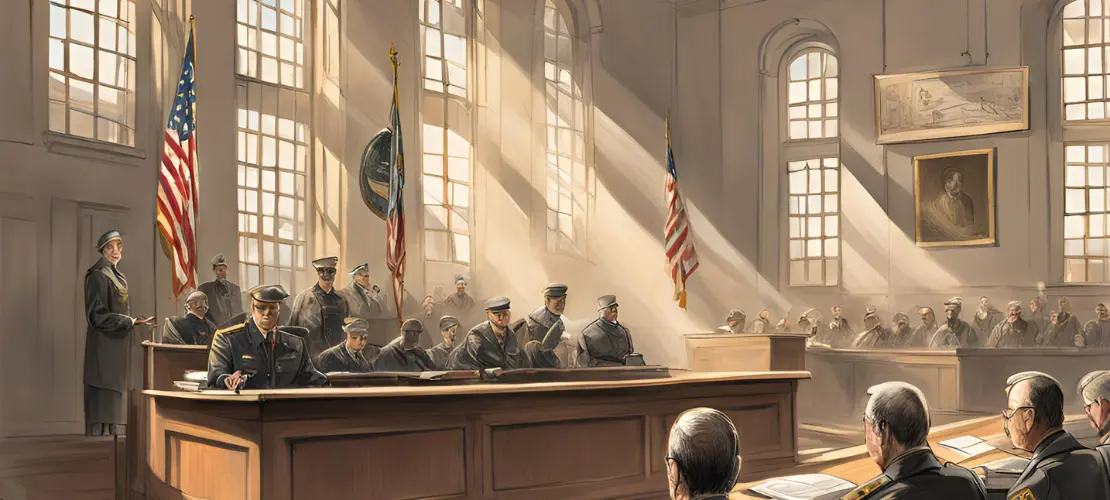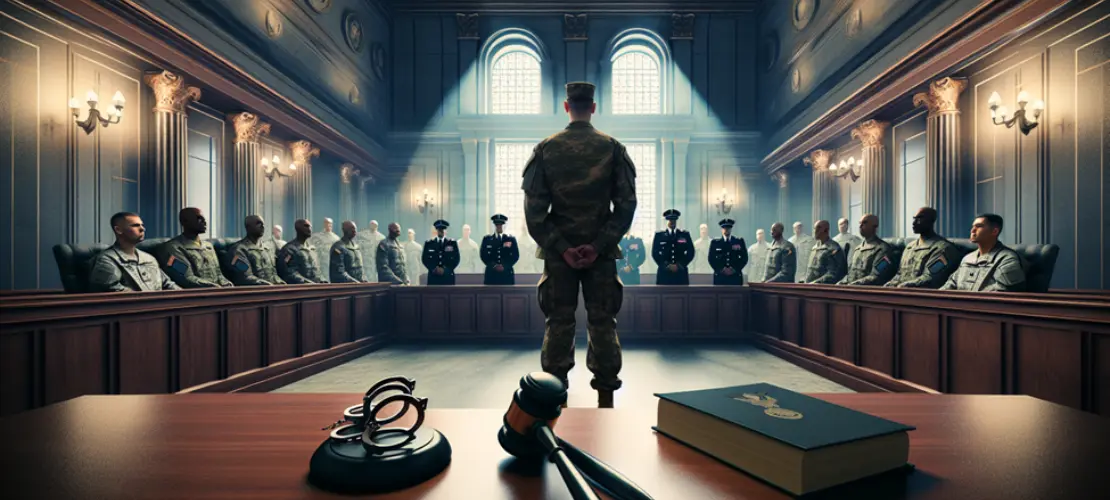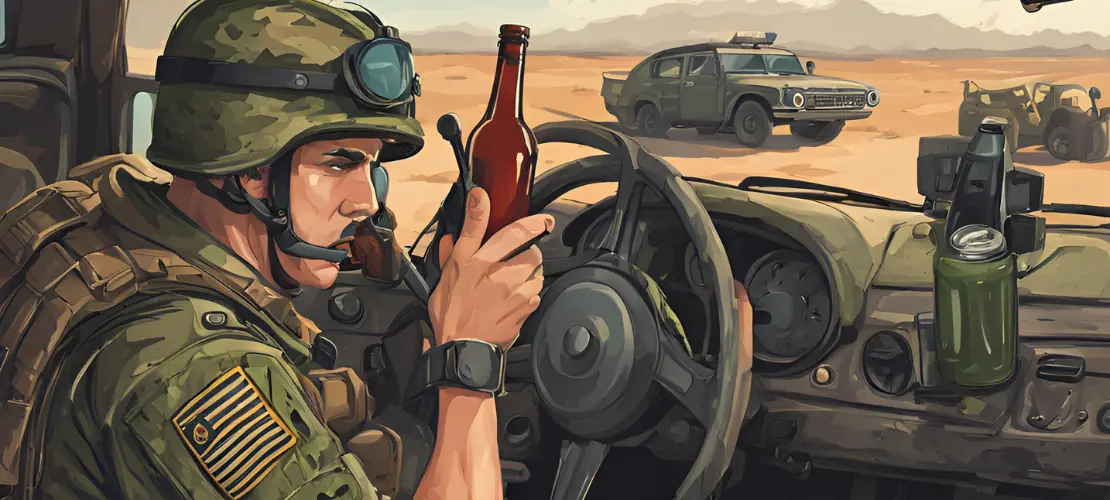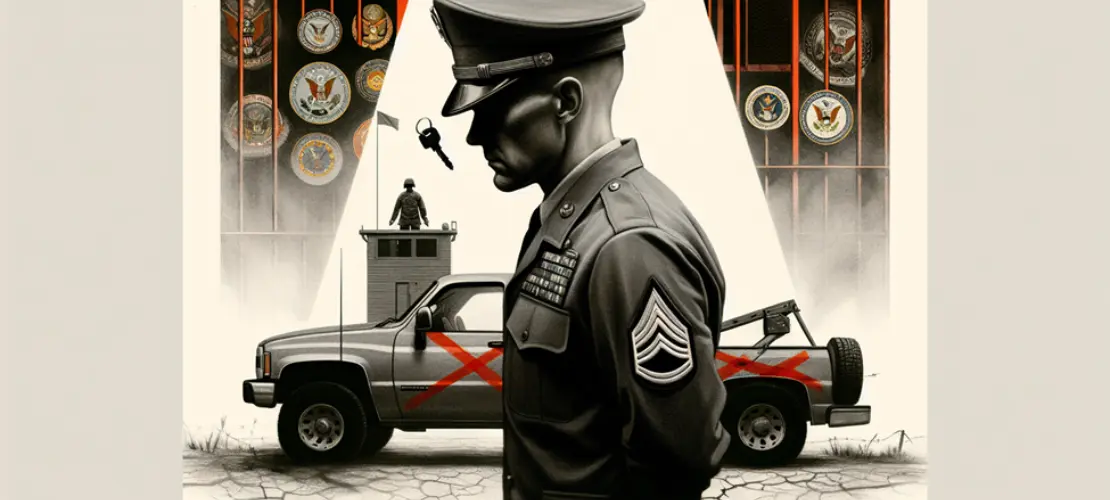updated 11/17/2025
The Realities of a Drunk Driving Charge While on Active Duty
Let’s get real: a DUI in the military has serious consequences that can affect your career and life. That’s why our latest resource from TriCareRehabs.com breaks down all the details and when to get help for alcohol abuse before you need it.
Our latest resource from TriCareRehabs covers what to expect if you get a DUI in the military, including legal penalties, career impact and on-base and off-base DUIs. And if you or a loved one could use treatment resources, our confidential hotline is here for you.
Quick Facts on DUIs in the Military
- Military DUIs are prosecuted under the Uniform Code of Military Justice (UCMJ) and can result in serious consequences including loss of rank, pay and discharge.
- On-base DUIs are under military jurisdiction and are prosecuted in the military courts while off-base DUIs can result in both civilian and military penalties.
- A DUI conviction can ruin a service member’s career and personal life, potentially leading to discharge, loss of benefits and civilian employment problems; getting effective treatment can mitigate some of the consequences.
- TRICARE in-network alcohol and substance abuse treatment programs can be found on TriCareRehabs.com and our confidential hotline.
What Does a DUI in the Military Mean for Me?
When it comes to Driving Under the Influence (DUI) in the military, the consequences are much higher than in civilian life. The military has a zero-tolerance policy for drunk driving and the penalties are severe and long-lasting for this form of incident.
Service members need to understand that a DUI is more than just a traffic violation; it’s a serious breach of military discipline with career and personal life consequences.
DUIs are prosecuted under the Uniform Code of Military Justice (UCMJ), which means the military justice system takes them very seriously. This means service members face not only civilian penalties but also military-specific consequences that can affect their rank, pay, and ability to serve.
Since the courts are less lenient with DUI charges than with other offenses, service members need to be aware of the risks and consequences.
What if a DUI Happens on a Military Base?
If a DUI happens on a military base, the situation is under military jurisdiction. These cases are covered under UCMJ Articles 111 and 911 of military law. Unlike civilian DUIs which are handled by local authorities, on-base DUIs are handled entirely within the military court system. Civilian authorities have no jurisdiction over these cases.
On-base DUIs can be handled in different ways depending on the severity of the offense and the discretion of the commander. These cases can be tried by court-martial or non-judicial punishment under Article 15.
Commanders have the authority to impose administrative penalties, which can range from administrative actions to more severe penalties. If found guilty a service member may face consequences such as license suspension, mandatory interlock device, and other disciplinary actions.
What Happens if a Uniformed Service Member Gets a DUI Off Base?
When a uniformed service member is arrested for a DUI off base, the situation gets more complicated. In these cases, the service member can face prosecution in both civilian and military courts. This dual jurisdiction can result in double jeopardy, where the individual faces two sets of consequences for the same offense.
The military will not intervene in a DUI case being prosecuted in civilian courts off base.
An off-base DUI arrest for a military member can be overwhelming. They may face:
- Civilian court.
- Administrative actions on the base.
- Corrective training and substance abuse treatment.
- Additional military charges.
- In some cas,es separate DUI charges under the UCMJ.
This multi-pronged approach to off-base DUIs shows how serious the military is about these offenses and the severe consequences that can impact a service member’s civilian and military life.
A Brief Note About Civilian DUIs on Military Installations
While we focus on service members, civilians can also be charged with DUI on military bases. These cases are prosecuted in federal court using state DUI laws, as there are no federal DUI statutes. The individuals most affected are family members of service members and civilian employees on the base.
Remember, TriCareRehabs.com can help immediate family members covered under military insurance find reputable and accredited treatment options nationwide. This can be important for those who need to comply with court-ordered treatment or seeking help voluntarily after a DUI on a military installation.
What is the Military DUI Legal Framework?
The legal framework for DUI offenses in the military is found in the Uniform Code of Military Justice (UCMJ). This is the comprehensive law that governs service members and the basis for all offenses, including driving under the influence. Every service member should be aware of this framework as it governs the process of DUI cases and the consequences they may face.
At the core of the military’s approach to DUI offenses is Article 111 of the UCMJ. The article states the consequences for military officers found driving recklessly or under the influence of alcohol or drugs. They shall be punished as directed by court-martial.
Also, as we mentioned earlier, for less severe cases, Article 15 of the UCMJ provides for non-judicial punishment so commanding officers can handle minor DUIs without a full court-martial. This two-tiered approach allows the military to address DUIs with the appropriate level of severity and flexibility.
More on Uniform Code of Military Justice (UCMJ) Article 111
Article 111 of the UCMJ is the foundation of the military’s DUI legal framework. This article goes beyond just drunk driving; it prohibits the reckless or wanton operation of vehicles, aircraft, or vessels while intoxicated. This broad language allows the military to address any situation where a service member may put themselves or others in danger due to the impaired operation of any type of vehicle.
Article 111 also specifies penalties for operating a vehicle with a blood alcohol concentration (BAC) above the legal limit. This mirrors civilian law, so there is a clear standard for what is impaired driving.
But even if a service member’s BAC is below the legal limit, they can still be charged under Article 111 if they are impaired by alcohol or drugs. This shows the military is serious about discipline and safety.
What Does Article 15 Non-Judicial Punishment for Minor DUIs Cover?
For minor DUIs, the military has a process to handle the situation without a full court-martial. This is where Article 15 of the UCMJ comes in, providing for non-judicial punishment for minor offenses. This allows commanding officers to handle minor DUIs quickly and efficiently without the need for a formal court-martial.
However, the accused service member can demand a court-martial trial instead of accepting non-judicial punishment under Article 15. This is an important safeguard so service members have the option for a full trial if they think the non-judicial punishment is unfair or if they want to contest the charges.
Can You Get a Court Martial for OUI in the Military?
When a DUI in the military is too severe for non-judicial punishment, or the accused service member demands it, the case goes to court-martial. A court-martial is a military court that determines punishment for personnel convicted of crimes.
These are formal and structured proceedings to fairly and thoroughly examine the charges against the accused.
There are three types of court-martial in the military justice system, each with different levels of severity and punishment. The types of court-martial are:
- Summary court-martial: This is the lowest level and can sentence an offender to up to 30 days of confinement or hard labor.
- Special court-martial: This type allows for defense attorneys and can sentence up to a year of confinement.
- General court-martial: This is the highest level and can impose the maximum penalties, including long prison sentences and dishonorable discharge.
In military DUI cases, as with drug possession charges, a court-martial can be requested by the offender or the commanding officer. These proceedings involve a jury of military members who hear the evidence and determine the verdict. A jury of peers ensures the accused service member is judged by those who understand the unique situations and responsibilities of military life.
This shows the military is serious about justice and fairness, even as they are strict on alcohol-related offenses.
What are the Penalties for a Military DUI Charge?
The penalties for a military DUI can be severe and far-reaching, and affect many areas of a service member’s life and career. One of the most immediate is administrative actions. These can include loss of driving privileges, which can be tough for service members who need personal transportation to do their job.
Offenders may also have to do corrective training to address the underlying issues that led to the DUI and prevent future ones.
Another is mandatory enrollment in substance abuse treatment programs. Although this may seem punitive, it’s important to understand these programs are to help service members overcome potential substance abuse issues and prevent future incidents.
Commanders can mandate treatment after a DUI. If off-base treatment is required, resources like TriCareRehabs.com can help find programs that meet military requirements and individual needs.
Beyond these administrative actions, service members who are convicted of a DUI may face:
- Reduction in rank, which affects one’s status in the military and pay.
- Fines.
- Confinement from a few days to several months, depending on the offense.
- Discharge from the military can end one’s military career and affect future civilian employment.
A DUI Can Ruin Your Military Career
A DUI conviction can have a long-lasting impact on a service member’s military career. One of the most immediate and severe is discharge. Depending on the circumstances, a DUI can lead to less-than-honorable or dishonorable discharge.
This type of separation from the military can harm a service member’s reputation and future opportunities both in and out of the military.
Even if discharge is not issued, a DUI conviction can still ruin a military career. For example:
- Denial of reenlistment, which means the service member’s military career is over.
- A Letter of Reprimand – this can hurt future promotion opportunities.
- The offense will be on the service member’s permanent record and will influence every future career decision made by their superiors.
This can be especially tough for those who had planned on the military as a long-term career.
Another career impact of a DUI conviction is loss of security clearance. Many military jobs require security clearance, and losing that can severely limit a service member’s ability to do their job or advance in their career.
For jobs that require the ability to carry a weapon, a DUI conviction can be especially tough. Not being able to carry a weapon due to a DUI conviction can make it impossible for some service members to do their jobs and could lead to reassignment or separation from the military.
What are the Post-DUI Challenges for Military Members?
The challenges for military members after a DUI conviction go far beyond the immediate legal and career consequences. They will often find themselves dealing with a multitude of personal and professional challenges that can have long-lasting effects on their life.
Understanding these challenges is key for service members facing DUI charges, as it can help them prepare and potentially mitigate some of the hardships they will face.
One of the biggest post-DUI challenges is finding gainful employment after leaving the military. Many companies won’t hire someone with a DUI on their record, especially if the reason for their military separation was due to the offense. This employment challenge can lead to:
- Financial struggles, as it’s hard to get loans without proof of employment and income.
- Strained personal relationships can lead to marital issues.
- These financial and personal challenges are made worse by the loss of military benefits after a DUI conviction.
Employment
One of the biggest challenges for military members with a DUI conviction is finding employment after leaving the service. A dishonorable discharge due to a DUI can ruin a service member’s reputation and make it hard to get civilian employment.
Many employers view a DUI conviction especially one that led to military discharge as a red flag for reliability or judgment issues. This stigma can be especially tough in fields that require a clean driving record or positions of trust and responsibility.
As a result, former military service members may have to settle for jobs below their skill level or outside their field of expertise.
Financial and Marital
The financial impact of a military DUI can be big and long-lasting. The consequences can be:
- Loss of income due to demotion, discharge, or difficulty finding civilian employment
- Financial stress for the service member and their family
- Difficulty in meeting basic needs, paying bills, or maintaining the standard of living
- Strain on relationships, especially marriages, as couples try to navigate new financial challenges
These can have a long-term effect on the military service member and their family.
On top of that is the big increase in car insurance premiums that follows a DUI conviction. These rates can stay high for several years (or more) as the individual tries to get past the incident.
The combination of reduced income and increased expenses can create a perfect financial storm that can lead to debt, bankruptcy, or having to downsize your entire lifestyle. This financial stress can add to the tension in the family unit and can lead to conflicts, separation, or even divorce.
Loss of Benefits
One of the biggest long-term consequences of a military DUI is the loss of benefits. When separation proceedings are initiated due to a DUI offense the service member’s entitlement to military pension and other benefits are often in dispute. This uncertainty can be very stressful as these benefits are often a big part of a service member’s long-term financial planning and security.
It gets even worse if the DUI conviction results in a dishonorable discharge. In that case, the service member may lose their retirement benefits. This can be devastating, especially for those who have served for many years and were counting on their military pension as a big part of their retirement income.
The loss of these benefits goes beyond just the pension and can include healthcare coverage, education benefits, and other support services available to veterans. This sudden removal of the safety net can have big implications for the individual’s future financial stability and quality of life.
Finding TRICARE Treatment Options Following a DUI
Although the consequences of military DUI are overwhelming, it’s important to understand that seeking help in the form of effective alcohol rehab or treatment programs is not only good but often required. While not required in all DUI cases involving a member of the Armed Forces, finding effective evidence-based substance abuse treatment can prevent another offense and minimize the consequences.
This proactive approach shows you are addressing the underlying issues that led to the DUI and can be looked upon favorably by commanding officers and courts.
For service members and their families looking for treatment options, TRICARE, the health care program for uniformed service members, has substance abuse treatment programs. But navigating these options can be complicated especially during a stressful time. That’s where resources like TriCareRehabs.com can be helpful.
By calling TriCareRehabs.com confidentially, you can get a better understanding of your benefits and explore treatment options.
Contact TriCareRehabs for Proven DUI Support Options Today
As we’ve seen throughout this post, a military DUI is a big deal with big consequences. From the immediate legal consequences under the UCMJ to the long-term effects on your career, personal life, and future, a military DUI can be devastating.
But help is here from our support team at TriCareRehabs.
Seeking TRICARE substance abuse treatment can be a big step in minimizing the consequences of a DUI and preventing another one. If you, a fellow service member, or an immediate family member covered by TRICARE is facing a DUI charge or struggling with substance abuse, contact us now.
FAQs about Military DUI Charges and Getting Help
What differences are there between an on-base vs off-base DUI?
The biggest difference is that on-base DUIs are handled through the military justice system and off-base DUIs can be prosecuted in both civilian and military courts which can result to double jeopardy and two sets of consequences. Be careful in both cases.
Can one DUI end my military career?
One DUI can be devastating to your military career, demotion, loss of security clearance, denial of reenlistment or even discharge depending on the circumstances and your service record.
How will a military DUI affect my security clearance?
A military DUI can result to loss of security clearance which is required for many military positions. This loss can prevent you from performing your duties and advancing in your career and the decision depends on several factors including the details of the DUI and your overall record.
Are there alternatives to court-martial for minor DUIs?
Yes, for minor DUIs, commanding officers can use non-judicial punishment under Article 15 of the UCMJ which is faster than a court-martial. But the accused can demand a court-martial instead.
How will treatment help after a military DUI?
Treatment after a military DUI shows you’re taking steps to address the underlying issues which can be looked at favorably by your commanding officer and the court. It can also prevent future incidents and meet any treatment requirements.
- Is There a National Guard Substance Abuse Program? - December 29, 2025
- Marine Corps Substance Abuse Program Guidance - December 8, 2025
- Does Spice Show Up on a Military Drug Test? - December 2, 2025





